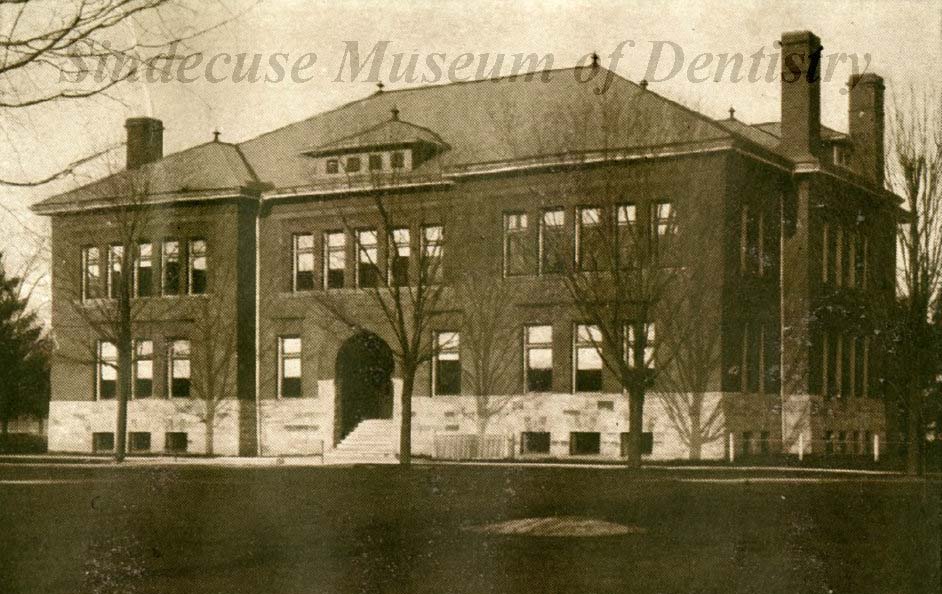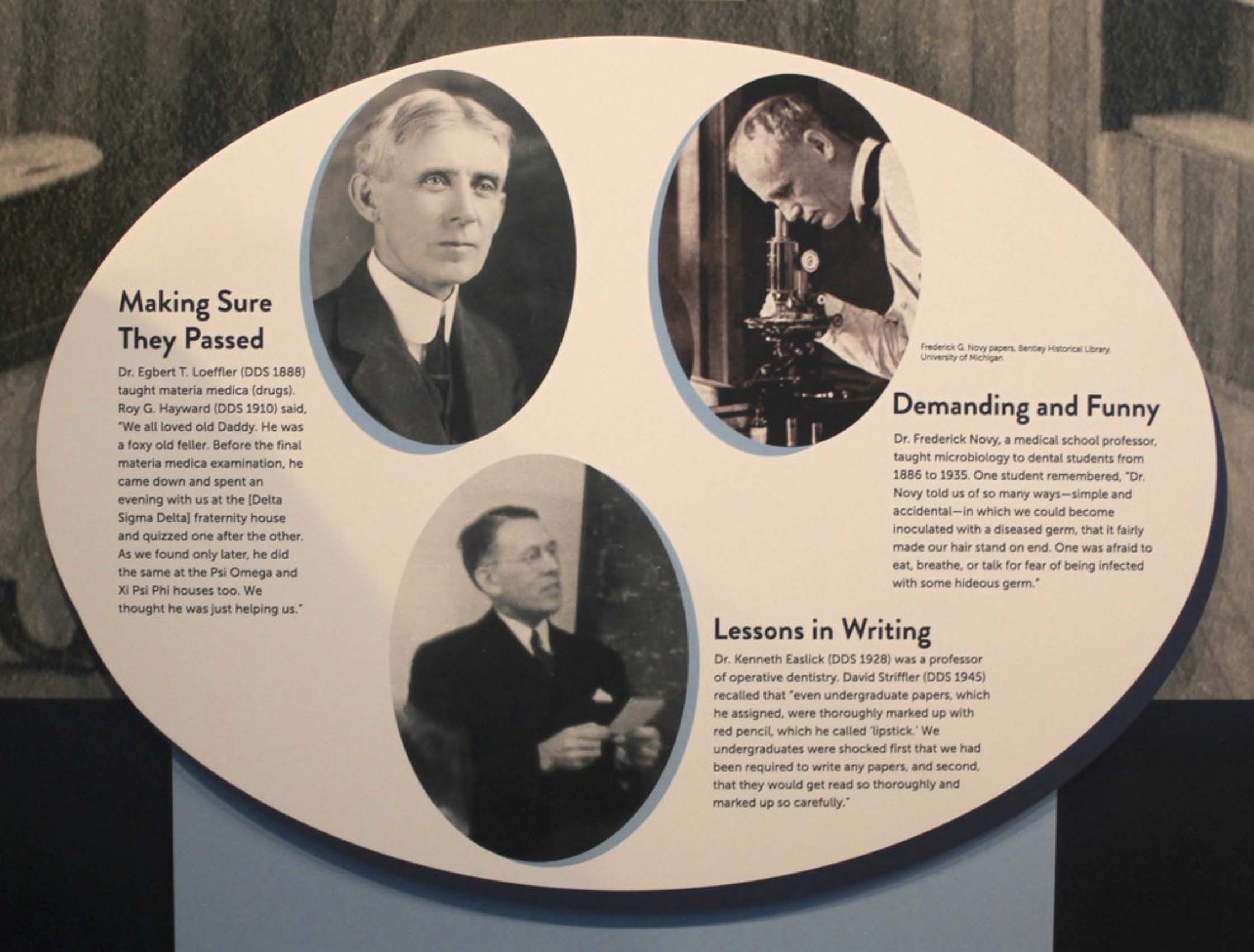introduction
In the 140 years since the University of Michigan School of Dentistry was founded, over 12,000 students have created close bonds with each other and with faculty who nurtured and challenged them in their journey to become dentists. Students in the dental program have always needed a solid background in the sciences and have benefitted from the school’s commitment to incorporating the latest clinical techniques, research and technology into its curriculum.
You can get a glimpse of the Student Reflections exhibit from our Flickr galleries or come visit our exhibit spaces in the School of Dentistry’s atrium to learn more about:
The Founding: From Tooth Carpenters to Health Care Professionals
What Students Learn
Student Life
Admission and Tuition

School of Dentistry Buildings
In 1875, the U-M Regents provided $3,000 for the new dental college to hire faculty and provide a facility. For the first 33 years, the school made do with inadequate space and remodeled buildings. Construction of the 1908 and 1969 buildings, designed specifically for dental education, significantly improved the school’s program.
1st Dental College building 1875-1877. SMD 652.107a
First Building: 1875-1876
The dental school briefly shared a house on N. University with the homeopathic college, but rivalry between the two colleges over scheduling led to friction. In one incident, dental students “stormed up the old wooden stairs and forcibly ejected the homeopathic students from the classroom.” In retaliation, the homeopathic students gave a cow a laxative and managed to get her upstairs. Dental students found her before any damage was done and lowered her back down the stairs with a rope and pulley.
2nd Dental College Building 1877-1891, SMD 161.397.
Second Building: 1877-1890
After only two years, the dental college desperately needed more space and moved to a different house on S. University. An addition housed the freshman laboratory on the first floor and expanded the clinic on the second floor, making room for a museum and library. The junior laboratory occupied a former woodshed.
3rd Dental College Building 1891-1908, SMD 161.399a
Third Building: 1891-1907
In 1891, the dental college moved to the former University Hospital on N. University. The regents provided $15,000 to expand clinics, laboratories and operating spaces for 150 students. Gas lighting increased visibility in clinics.
Despite improvements, the building was still inadequate. Students described the old buildings as “boards with battens over the cracks” and called them the “cow sheds.” In 1903, U-M President James Angell agreed the dental school was “wretchedly housed.” He pushed the regents for a new building to accommodate increased enrollment and provide modern facilities.
4th Dental College Building 1908-1968, SMD 161.401a.
Fourth Building: 1908-1968
The new dental school was three stories of fireproof brick and stone with state-of-the-art facilities for operative and surgical clinics, X-ray, research and technical laboratories, offices, a library and a museum. It also had electricity and central heating. President Angell declared it the finest dental education building in the country. Fifteen years later, an addition increased floor space to accommodate up to 97 dental students and 30 dental hygiene students per class.
5th Building/Kellogg Building 1940, SMD 462.6
Graduate Studies Have a Home
The school’s desire to expand its graduate programs in dental specialties led to the W.K. Kellogg Foundation Institute, the first building in the world dedicated to that purpose. Opened in 1940, it included an auditorium, clinics, laboratories and offices.
Photo credit: Dr. Andrew Horne
Sixth Building: 1969-present
In 1969, the school completed a new building that incorporated advances in dental instruction, materials and techniques into greatly expanded clinics, laboratories, classrooms and audiovisual and computer facilities. An entire eight-story wing was dedicated to faculty research as part of a university commitment to expand research. The building could accommodate 150 dental students and 80 dental hygiene students in each class, plus, 125 graduate students, an increase of 70 percent over the old building.

Student Profiles
Many School of Dentistry students’ reflections, accomplishments, and tools are on view in the Student Reflections exhibit, installed in 2017 in the atrium and cafe area that connects the School of Dentistry Building with the Kellogg Building. Profiles below provide a sampling of the evolving dental student life at University of Michigan over the years.
Bion Bates
Bion Bates
A typical student, Bion Bates (DDS 1905) grew up on a farm in Elsie, Mich., and worked there when he wasn’t in school. Bates kept a school diary, recording the weather, interesting class experiences, and expenses. That diary, along with his dental cabinet and his student instrument case, are displayed in the Student Reflections exhibit.
A photograph of the practice he’d later open back home in Elsie, including a “honey” of a new dental chair that he wrote about in his diary, can be seen across the atrium from the Student Reflections exhibit in Inside the Dental Practice: 1860-1940.
Gordon H. Sindecuse
Gordon H. Sindecuse
The founder of the Sindecuse Museum of Dentistry was a graduate of U-M’s Dental School (DDS 1921). You can learn more about Dr. Sindecuse, in his own words, by checking out our excerpt of his memoir.
Jessica Rickert
Jessica Rickert working
Jessica Rickert
Jessica Rickert (DDS 1975) was one of six women in her class of 140 and the first female American Indian dental student. In the Student Reflections exhibit, Dr. Rickert recalls courses where "it became more and more obvious that we would hold the very health of our patients in our hands, a huge responsibility." Rickert is an entrepreneur as well as a dentist. Check out two products from her company in another Sindecuse exhibit, Tooth Fairy Magic.
Travis Sterner
Travis Sterner
Travis Sterner (DDS 2005) is the most recent graduate to be profiled in this section of the Student Reflections exhibit.
In his student days, Sterner noticed that older dentists were more formal and authoritarian. Younger dentists laughed more, had a team mentality and built more informal relationships. The exhibit features his recollections as well as his student dental kit, a tackle box stocked with materials for the bridge preparation, temporary and endodontics portions of the Northeast Regional Board of Dental Examiners. The kit includes files, burs, polishers and materials for making impressions. Its contents can be searched our online collection using PastPerfect; The link should direct you to a page where you can search for objects from this collection by entering the term “Sterner,” or any other term you’re interested in. The accession number for the Sterner Kit is 0982.
In addition to alums Bion Bates, Gordon Sindecuse, Jessica Rickert and Travis Sterner we’ve introduced here, many more graduates of the School of Dentistry are quoted and pictured in the Student Reflections exhibit, or have made donations of museum items for exhibits like this one.

